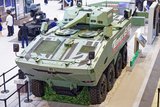Elbit Systems tests new AFV
Elbit Systems has concluded testing of its new Armored Fighting Vehicle (AFV) as part of the Israeli Ministry of Defense’s CARMEL Future Combat Vehicle project.
The AFV applies autonomous capabilities and artificial intelligence to accelerate decision making and facilitate target engagement with increased rapidity and accuracy.
Using a Helmet Mounted Display (HMD) a crew of two operates the AFV under closed hatches, enhancing capabilities and survivability. The system transmits real-time, high resolution video to the crew’s HMD, providing them with a 360° view of the surroundings, together with relevant symbology and C4I data.
The AFV has successfully demonstrated its capacity to function as an independent high fire-power strike cell, as a networked station for multi-spectral sensing and information fusion, as well as a base platform for operating additional unmanned systems.
According to the company, the AFV is capable of performing combat tasks including off road driving, target acquisition and high precision fire missions, in day and night. As the vehicles is networked, it can carry out missions ordered by commanders and other fighting platforms as well as to transmit missions and intelligence to other forces.
Additionally, the AFV is capable of operating other unmanned platforms such as a VTOL to feed intelligence into the crew’s operational picture or a fighting UGV to perform high risk missions.
More from Land Warfare
-
![US DoD task force’s DroneHunter acquisition lays groundwork for Replicator 2 CUAS strategy]()
US DoD task force’s DroneHunter acquisition lays groundwork for Replicator 2 CUAS strategy
As the US Department of Defense looks to counter the growing threat of uncrewed aerial systems to improve homeland security, the DroneHunter acquisition could point to future commercial innovation.
-
![Norway opts for Hanwha’s Chunmoo for long-range fires under $2 billion deal]()
Norway opts for Hanwha’s Chunmoo for long-range fires under $2 billion deal
The selection of Hanwha’s K239 Chunmoo long-range precision fires system, with a contract expected to be signed on 30 January, makes Norway the second European country to choose the system. It is expected an operational system will be in service within four years.
-
![Canada looking to expedite purchase of armoured fighting vehicle and a new tank]()
Canada looking to expedite purchase of armoured fighting vehicle and a new tank
Canada is improving its Leopard main battle tank fleet but before this is fully completed, it is expected to begin looking for new vehicles.























